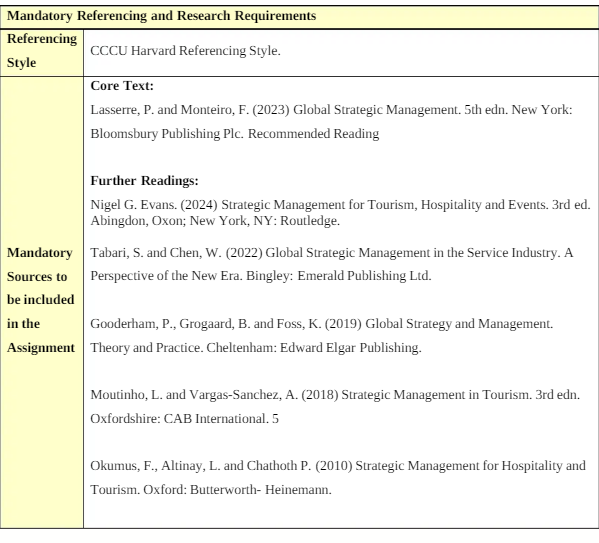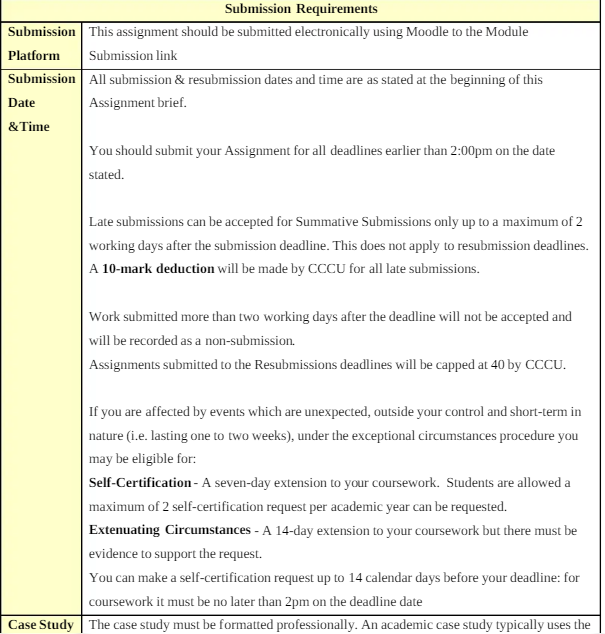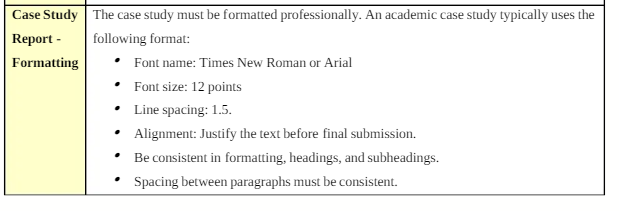| Category | Case study | Subject | Management |
|---|---|---|---|
| University | Canterbury Christ Church University (CCCU) | Module Title | BTM6GSM Global Strategic Management |
| Assignment Type: | Case Study | Level: | 6 |
| Words count: | 4000 | Assignment no.: | 1 |

Students will be required to produce one piece of written work for the assessment for this module which will cover MOS 1,2,3 & 4. The written assessment will consist of a 4,000- word case study report (100%) on strategic management of a tourism organisation, choosing from the following: P&O Cruises, Royal Caribbean Cruises, British Airways OR Travelodge (choose only one organisation).
This assignment will encourage students to gain an understanding of the principles of Global Strategic Management and their application within the tourism industry. It will facilitate them to have an in-depth understanding of the nature of global corporate strategy, strategic decision making and global strategic processes within and between organisations.
This assignment will encourage students to apply what they learnt from the module to a topic and will be submitted in the form of a case study. Through the development of a 4,000-word case study report, students will have the opportunity to demonstrate their comprehension of global strategic management concepts and analyse the various drivers of sustainable strategic development and apply strategic management principles across a range of organisational types, showing an ample knowledge of such concepts as sustainability, corporate responsibility, strategic planning, decision-making and implementation.
Students will need to touch down on the internal and external environment analysis, strategic options, global business issues, strategic context of organisations, sources of competitive advantage, international strategies selection and evaluation as well as sustainable strategic development. By selecting a strategic management case study within the tourism sector, students will analyse real-world scenarios, identify key challenges and opportunities, and propose strategic solutions to enhance organisational performance and sustainability.
Additionally, this assignment will foster critical thinking, research skills, and the ability to articulate global strategic management principles effectively through written communication. This will help you to demonstrate good academic practice in written work, advance on how to avoid plagiarism and how to use appropriate referencing using an established referencing system.
Overall, it is important that students bear in mind that for this assessment, you are required to produce one piece of written work for this module which will cover MOS 1,2,3 & 4.
Are You Looking for Answer of BTM6GSM Assignment 1
Order Non Plagiarized AssignmentAssignment Topic: Strategic Management of a UK based tourism organisation in the global task/s to be business environment context (4000 words)
WHAT YOU ARE ASKED TO DO?
Conduct case study research on global strategic management and (choose 1) of the UK- based tourism organisations from the four organisations:
Demonstrate an in-depth understanding of the nature of global corporate strategy, strategic decision-making, and global strategic processes within the chosen organisation: explore its intemal and external business environment, its global strategic opportunities, global strategic issues/challenges, and its competitive advantage.
Provide recommendations for a future global strategy and implementation plan for the chosen tourism organisation (4000 words).
The Case Study must:
Important:
This case study research must be based on reliable research and have a minimum of 20 different sources within it which includes the core reference lists.
Please ensure you use both direct and indirect citations.
Additional
Information The guidance below sets out the requirements of the task and a suggested structure for the
required to case study.
support completing the tasks above
Chapter One - Introduction (350 words)
Aims and objectives of the case study, comprehensive definition of strategy, global strategy, global corporate strategy, and global strategic management. Also, introduce the tourism organisation of your choice from the four organisations with its brief history, and outline the structure of the case study research.
Chapter Two Strategy, Global Strategy and concept of Strategic Management (600 words)
Chapter Three Organisational strategy, corporate strategy, strategic processes, strategic options, strategic decision making (650 words).
Chapter Four - Transitioning of Strategic planning, Industry Interpretation and the Organisational Impact (650 words).
Chapter Five - Impact of industry limitations and potential solutions (700 words)
Chapter Six - Competitive advantage, Competitive analysis and their application (700 words).
Chapter Seven - Conclusion and Recommendations (350 words)
Summarise your findings, reiterate the key points and arguments on strategic management of your chosen organisation. Put forward the key findings of the processes, strategic options, strategic decision making within the organisation.
Highlight the identified strategic opportunities, strategic issues/challenges.

Buy Answer of BTM6GSM Assignment 1 & Raise Your Grades
Request to Buy Answer

|
Table of Penalties |
|
|
Issue with the Assignment |
Penalty to be Applied |
|
Suspected Academic Misconduct or Breach of Academic integrity |
The Assignment will be graded zero. Written feedback will be ‘This assignment has been identified as potential Academic Misconduct/Breach of Academic Integrity. You will be invited to a meeting to discuss’. You will be invited to a meeting with an academic Misconduct reviewer. When you attend the meeting if Academic Misconduct or the breach of Academic Integrity is upheld you will be asked to rewrite the section of the assignment it applies to and re-submit the assignment. Do not upload any assignments to the AMC submission links before the meeting otherwise it will be removed. Failure to attend the meeting means the assignment will remain graded at zero and you will be unable to pass the module until you have attended the meeting. |
|
The assignment is more than 10% over the prescribed wordcount i.e. for 3,000 words, if 3,400 is submitted excluding the cover page, table of contents, references and appendices. |
A 10-mark deduction applied to the overall grade that is manually entered by the Lecturer. This deduction is capped at 40%, which means an assignment cannot get less than 40% if a deduction has to be made. For example, if the mark for the assignment was 60. The lecturer would deduct 10 marks, and the mark will be 50. Written feedback will also state ‘This assignment is 10% over the wordcount and 10 marks have been deducted’. |
|
Where assignments are more than 10% less than the prescribed wordcount and lecturers cannot identify if the learning outcomes have been met. |
This assignment will be graded below 40. |
|
Where a student submits a .pdf instead of a word document. |
This assignment will be graded a Fail. The lecturer will grade as 1 and the written feedback will state ‘This is a pdf submission and is not allowed. All submissions should be in Microsoft Word format’. |
|
Students not working in their groups as agreed by the lecturer. |
This assignment will be graded a Fail. The lecturer will grade as 1 and the written feedback will state ‘This submission was not completed in the designated group’. Please note: Where a student has asked the lecturer to move from their original group and the lecturer has agreed this does not apply. |
|
For a presentation assignment that requires oral delivery, and the student does not present in person. |
The Oral rubric criteria is not moved, and the oral criteria will remain at zero. |
|
For a presentation assignment and the student does not upload a converted PPT To Word File with speaker notes. |
The communication rubric criteria is not moved, and the communication criteria will remain at zero. |
|
For a presentation assignment that requires oral delivery, and the student did not present on the day or upload the presentation to a Word document with speaker Notes. |
This assignment will be graded a Fail. The lecturer will grade as 1 and the written feedback will state ‘There was no Oral presentation in class and the submission was not converted to Microsoft Word’. |
|
For a presentation assignment the student uploads a file that contains no slides and is simply continuous text. |
This assignment will be graded a Fail. The lecturer will grade as 1 and the written feedback will state ‘There are no slides present in the assignment submission’. |
|
If the assignment is group work and the resubmission is not changed to individual work. If a group assignment is failed, then the resubmitted work must be changed by a minimum of 25% to make it an individual piece of work. This means if a Group Presentation is 12 slides a minimum of 3 must be different to the group submission. If the assignment is a Group Poster with 6 text boxes, then a minimum of 2 of them must be different to the Group Poster. |
This assignment will be graded a Fail. The lecturer will grade as 1 and the written feedback will state ‘This resubmission should be individual and a minimum of 25% of the assignment has not changed’. |
|
Where a written assignment has text that is unable to be read by Turnitin because it is either a graphical image (excluding Presentations & Posters); for example, a screenshot or the assignment is written within text boxes on each page. |
This assignment will be graded 0 and the written feedback should state ‘This assignment is unreadable by Turnitin and cannot be checked for Academic Misconduct. It has been referred for an AMC meeting’. The assignment will then be referred for Academic Misconduct investigation. |
|
An assignment that does not make use of any Mandatory references provided in the assignment brief/Module Handbook. |
The reference rubric criteria is not moved and that criteria will remain at zero |
|
An assignment has a reference list, but no citations. |
The reference rubric criteria is not moved and that criteria will remain at zero. Written feedback should state ’The reference criteria has been graded Zero as no citations have been used. Please include citations in your assignment to support the academic points being made’. |
|
An assignment has no citations and no reference list. |
Foundation & Level 4 - The reference rubric criteria is not moved and that criteria will remain at zero. The written feedback will state ‘Please ensure that you use citations and references to support your assignment submission’. At Level 5 and Level 6 this would be graded as a Fail. The lecturer will grade as 1 and written feedback will also show ‘This assignment has no citations and no reference list’. |
|
Where False references are included in an assignment. |
This will be referred for Academic Misconduct. This assignment will be graded 0 and the written feedback should state ‘This assignment contains false references and has been referred for Academic Misconduct. You will be invited to attend an Academic Misconduct meeting’. |
|
Assignment is submitted after the Late Deadline or if it is a Resubmission, after the Resubmission deadline |
This assignment will be graded a Fail. The lecturer will grade as 1 and written feedback should state 'This assignment was submitted after the deadline. Please resubmit at the next resubmission opportunity.' |
The values of student integrity expected by CCCU are:
Honesty – being clear about what is your work and where your ideas come from other sources.
Trust – others can have faith in you being open about your work and acknowledging others’ work.
Fairness – you do not try to gain an unfair advantage in using others’ work.
Responsibility – you take an active role in applying the principle of Academic Integrity to your work.
Respect – you show respect for the work of others.
Students might choose to get support from their peers when preparing assessments, such as discussing the subject of the assessment, exchanging ideas, and receiving suggestions for improving the work. This is peer-support, and the University accepts this as a reasonable expectation when completing assessments. However, peers must not make any changes to anyone’s assessments as such actions could lead to allegations of academic misconduct.
Use of English as the medium of assessment:
Students cannot write an assessment in another language and subsequently translate their work into English or have it translated by any form of third-party. Use of translation software or third-party translators is a form of academic misconduct.
Students must write the entire assessment without using AI software such as ChatGPT. Submitting an assessment that contains any form of AI is a form of academic misconduct.
Students can make use of Microsoft Word’s grammar and spell-checking functions but the use of Grammarly is not allowed as it uses AI text generation. If students use third-party proofreaders, these cannot make any changes that alter the assessment in anyway including correcting language or citation format errors. Third-party alterations to the assessment are a form of academic misconduct.
Plagiarism can be defined as incorporating another person’s material from books, journals, the internet, another student’s work, or any other source into assessment material without acknowledgement. It includes:
Using exactly the same words (sentences, phrases or even expressions not in everyday use, invented or created by an author to explain an idea) as used originally
Rephrasing by making slight adjustments
Paraphrasing in a way which may deceive the reader as to the source.
Plagiarism in whatever form it takes is form of academic misconduct.
If students submit work for assessment that is falsely presented as the student’s own work but was jointly written with somebody else; this is a form of academic misconduct.
The inclusion in assessments of a significant amount of identical or substantially similar material to that already submitted for assessment by the student and graded for the same course or any other course or module at this University or elsewhere is classed as self-plagiarism. It does not include a resubmission of the same piece of work allowed by the examiners in an improved or revised form for reassessment purposes. Self-plagiarism is a form of academic misconduct.
Achieve Higher Grades BTM6GSM Assignment 1
Order Non Plagiarized AssignmentFacing challenges with your BTM6GSM Global Strategic Management Case Study Assignment 1? Well! Stop worrying now. You are at the right place. Our platform provides UK assignment help. We have experienced writers who provide high-quality, no-plagiarism assignments with 100% original content, and we are assured that our Business Case Study Help will make you productive and help you achieve high grades in your academic year. Contact us now!
Hire Assignment Helper Today!
Let's Book Your Work with Our Expert and Get High-Quality Content
